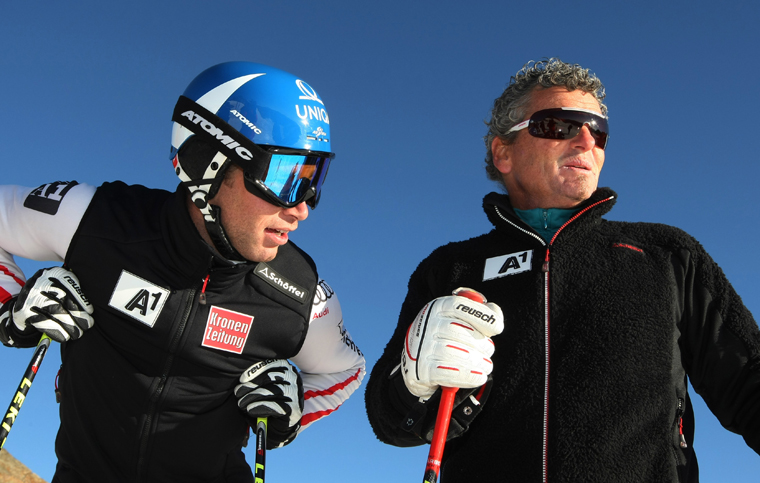The coaches behind the world’s best skiers


It can be back-breaking work dragging a bundle of gates up a mountain at first light. So what are the career prospects for a ski coach? If you get to the top and land a job on the World Cup, the rewards can run to six figures, but it will never match the £15m salary paid to Pep Guardiola at Man City. Like Guardiola, many top ski coaches start off as pro athletes, working their way into coaching with junior and Europa Cup-level teams.
Coaching a successful ski team can bring fame if not fortune. Charly Kahr, the coach to Franz Klammer and the Austrian downhill team from 1972-85, became famous in Austria, earning the nickname Downhill-Charly. Kahr retired at 53 to set up a ski shop and apartments by the Planai lift in Schladming. Others, like Karl Frehsner, head coach to the Swiss in the 1980s, switched to other sports. Frehsner worked with Sauber in F1 for two seasons before returning to the ski slopes to work with the Austrian women’s team. Even at 75 he was a personal coach to the Swiss star Lara Gut.
Young athletes need coaches with good demo skills as they learn from visual stimulus; and newly retired racers are perfect for the job. As those young coaches gain experience, their ‘off mountain’ skills come into play – team selection, financial management and public relations. The coaching moves from a mainly commanding mode, used for juniors, to becoming a sounding board for experienced athletes’ ideas and needs. Some, like the 1991 World Downhill champion Franz Heinzer, stick with their home country and coach at Europa Cup level, inspiring the young.
National teams split athletes into programmes depending on which disciplines those racers are concentrating on. Some, such as Marcel Hirscher, will be allowed to run their own programmes. Hirscher’s team is led by Mike Pircher, whose introduction to coaching was during the five years he spent working on the ISF snowboard tour in the mid-90s. Hirscher also has a conditioning trainer, physiotherapist, media co-ordinator and serviceman dedicated to his success. The higher a coach climbs the more assistants they acquire, but with that comes the pressure of producing results.
Austria produces the highest number of coaches who earn a crust with other national teams, but Henrik Kristoffersen’s coach, Christian Mitter, is unusual. Although Austrian, he has only ever worked within the Norwegian system, starting at the Oslo ski racing school before moving to the Norwegian Europa Cup, then World Cup team.
Benjamin Raich (left) with Austrian Mathias Berthold, who has worked with British, Austrian and German athletes | GEPA pictures/ Andreas PranterMany Austrian coaches cut their teeth with the British ski team. Dieter Bartsch moved from working with Konrad Bartelski to a fruitful stint with the Swiss women, Michela Figini and Maria Walliser, followed by a spell with the Austrian and Liechtenstein teams. He found success again with the Norwegians Skaardal, Aamodt and Kjus. Two of Alain Baxter’s coaches, Mathias Berthold and Christian Schwaiger, moved to the Austrian team and now work for the German team.
The biggest journeyman is an ex-coach of mine, Walter Hubmann. After coaching my brother Martin to an eighth Olympic place in Calgary in 1988, he moved to the Austrians, then to Bulgaria and Lebanon, before moving to the Croatians, then the Swiss, then back to the Croatians again.
Dave Ryding need not worry that his coach, Tristan Glasse-Davies, will defect to his country of birth: unusually, the pair are the same age and were team mates until Glasse-Davies quit racing aged 20. After a spell coaching at the British Ski Academy, Glasse-Davies moved to coaching the British team, first as assistant speed coach to Finlay Mickel, then Chemmy Alcott, before becoming the lead coach for Ryding.
In Kitzbühel this season Ryding scored a second place in the World Cup, Britain’s best World Cup result since Konrad Bartelski in the eighties. Ryding turns 30 this season and, potentially, has a few more good years of racing, but you can be sure that his results will not have gone unnoticed by the larger teams, doing Glasse-Davies’ career prospects no harm.